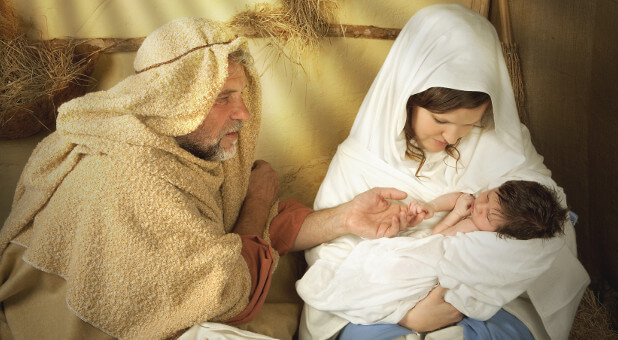When our children were little, they would awaken before daylight on Christmas Day, their eyes dancing with expectation. They could not wait to get downstairs to the Christmas tree to open the gifts. But before we opened the gifts, we read the Bible and I prayed. What a thrill it was to kneel in prayer together as a family and to thank God for the privilege of celebrating the birthday of His Son, Jesus Christ.
One of the passages that we read was the second chapter of Matthew, where the wise men came from the East to Jerusalem, following a star. They came into the house of Joseph, fell down and worshiped the Christ Child. The Bible says, “When they had opened their treasures, they presented gifts to Him: gold, frankincense, and myrrh” (Matthew 2:11).
Jesus Christ was born to be King. His salvation and His Kingdom apply to present-world problems. But His kingship also has future implications. The sovereignty of Jesus Christ extends in an unbroken line throughout the ages. Hidden from view now, He will come again, according to the Scriptures, in God’s time, and He will reign in righteousness.
The wise men of old inquired, “Where is He who has been born King?” (Matthew 2:2). Today wise people in these troubled times are also asking, “Where is He who has been born King?” The Bible says of Him: “Jesus Christ is the same yesterday, today, and forever” (Hebrews 13:8). He was King yesterday, He is King today, He will be King tomorrow.
Yesterday He was King of Redemption. He did not restrain the multitudes when they cried on Palm Sunday: “Blessed is the King who comes in the name of the Lord!” (Luke 19:38). He did not answer negatively when Pilate asked: “Are You a king?” (John 18:37). He did not deny His kingship when Pilate turned Him over to the crowd, saying, “Behold your King!” (John 19:14).
From His very birth Christ was recognized as King. Something about Him inspired allegiance, loyalty and homage. Wise men brought Him gifts. Shepherds fell down and worshiped Him. And angels, knowing more than men that He was truly King, became celestial minstrels before His manger throne. Herod, realizing that there is never room for two thrones in one kingdom, sought Jesus’ life.
As Jesus came to the age of approximately 30 years and began His ministry, His claims upon people’s lives were absolute. He allowed no divided loyalty. He demanded and received complete adoration and devotion. Men and women left their homes, their families and their businesses, and gave themselves in complete obedience to Him. Many gave their lives, pouring out the last full measure of devotion. We cannot understand Christ until we understand that He was King.
The Old Testament promises the coming not only of a deliverer and sin-bearer but also the coming of the King. This King had been eagerly expected, hoped for and prayed for by the pious in Israel.
Every true king has a herald—and on that first Christmas the angels heralded Jesus’ birth. John the Baptist also was a herald, preaching: “The kingdom of heaven is at hand!” (Matthew 3:2). When the King who was rejected comes again to set up His Kingdom, He will be preceded once more by a herald, who will declare His coming among His people (1 Thessalonians 4:16). All through His life Christ acted like a king. He spoke with authority. He made demands upon people’s consciences. He denounced bigotry, hypocrisy and greed. He denounced immorality, dishonesty and lawlessness. He spoke often of His coming Kingdom, and He recruited followers. His conduct was regal. His ethics were kingly.
From the beginning, the potentates of political, social and ecclesiastical life were distrustful of Him. His high ethical teachings, His irreproachable moral character and His regal lineage constantly jeopardized the security of the thrones of hypocrites.
But Herod needlessly feared Jesus. Pilate was unnecessarily suspicious of Him. Christ had not come to set up an earthly kingdom. He had come to be the King of redemption. His Kingdom was to be spiritual. He was to reign in the hearts of men and women.
By virtue of His kingly office, He was the only One in Heaven qualified to redeem a lost world. Had Jesus Christ been less than He was, He could not have made atonement for our sins. Fully aware of our inability to pay the price of redemption, Jesus Christ gave Himself as a ransom for us.












































